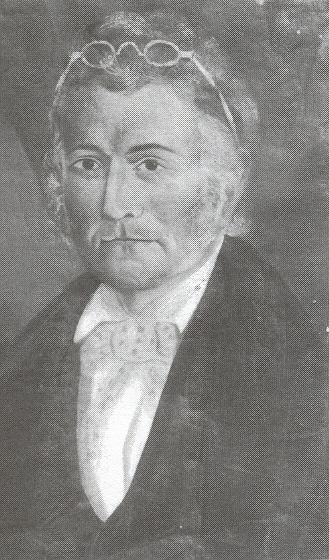CCLHP: Charles Morton

Picture captured from Nancy Easter-Shick and Bonnie Brooks Clark,
'Round the Square, 8.
In 1830, the site of present day Charleston was chosen to be the county seat for the newly established Coles County. The township was given the name Charleston in honor of Charles Morton, who, together with Benjamin Parker donated 20 acres of land for town purposes. Morton kept the first store, ran the first mill and was postmaster of the settlement. Nancy Easter Shick and Bonnie Brooks Clark have defined, in their book Round the Square, that Mr. Morton was the most affluent citizen within the area. This is why his name was chosen as the title the town assumed. Mrs. Shick and Clark also point out that the Morton family traveled from Kentucky to settle in the area directly around present day Charleston. During the 1830s, it was rather common for people to leave a designated area their families had settled in order to make a life for themselves. The United States had expanded drastically by emigration and high birth rates. The introduction of large groups of people into the country forced and allowed people to move to the western lands. The west also signified a way for people to make a name for themselves. When Charles Morton moved the region now known as Coles County, it was then, a rather sparsely populated area. Settlers like himself were coming in from all over the country to settle the American frontier. By moving to unestablished areas these settlers hoped to set themselves up un a environment that had been uncultivated by material interests. In a real way, many of these settlers were looking to make their fortunes out on the prairie. Many realized the only way to get ahead in the booming American society was to get away from the old areas of society, ie. the east, and set up a new life.
Charles Morton was definitely one of those entrepreneurs of the early 1800s. Upon coming to Charleston, Morton quickly realized the vast potential this land offered someone like himself. Once he relocated from Kentucky to Coles County Morton set up a small store and post office, which doubled as his own home. During this period, though Morton began to run into trouble. By 1840, Morton had become a plaintiff or defendant in some 25 cases - most are for debt, at least one is regarding boarders. Morton rented out lean-tos to new settlers to stay while their permanent dwellings were being constructed. Other cases brought, either by or against Morton include, robbery of boots, a silk waistcoat, and textiles, probably from Morton's store. Morton himself was indicted by a grand jury on charges of gaming, in September 1837 for all of 12 cents! Morton had an extensive record of having brushes with the law. But his cases never amounted to much more than mere fines or court orders to repay the debt he incurred.
Overall, Charles Morton represents a large contingent of men and women who moved across the prairie of the United States to make something out of themselves. In fact, Charles Morton is only one figure in the history of Charleston whom moved across the country in search of fortune and a better life. This displacement of individuals spread economic opportunities allowed to those who immigrated to the United States. Also this population of settlers, served to extend the ability of the United States to remain a growing and opportunistic society.
Images captured from Charles H. Morton's case files from the Coles County Circuit Court Case Files.Images captured from Illinois Regional Archives Depository via digital camera. (January 31, 2003) |
|
Charles Morton
-
Booth Library Archives, Illinois Regional Archives Depository, Coles County Legal History Project (multiple boxes), case numbers 216, 265, 352, 1331, and 1425 (online database).
-
Many of the cases contained within the Archives and database involve Morton in cases of debt. However, Morton is also involved in cases pertaining to borders, gambling, and robbery. Morton is seen as both a defendant and a plaintiff within the collection.
-
Also, CCLHP, Case No. 14, 1299, 1309, 1331.
-
-
Ladd, Marta Cates, and Constance Schneider Kimball. Coles County History, 1876-1976: Coles County Illinois. The Charleston Mattoon Bicentennial Commission, 1976.History of Coles County 1776-1976. Coles County, Illinois, Dallas, 1976, p. 220.
-
Much of the information on this source is mentioned above. However the work also contains information on Charles H. Morton, including his early business ventures in Charleston. Most of the information on Charles H. Morton can be found in page 220.
-
-
Easter-Shick, Nancy. and Bonnie Brooks Clark. 'Round the Square: Life in Downtown Charleston, Illinois 1830-1998. Charleston, IL: Easter Chick Publishing, 1999.








